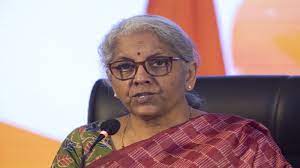INCHEON (South Korea), May 4: Finance minister Nirmala Sitharaman on Thursday stressed on the need for a robust ADB that adopts a transformational rather than incremental approach for sustainable and resilient regional development.
Highlighting that the world is passing through an age of “resets” – of fuel, food, fertiliser, debt, energy, supply chain, sustainability, fiscal stability, etc, she said “we need a robust ADB that adopts a transformational rather than incremental approach for sustainable and resilient regional development.”
Sitharaman is here to attend the 56th annual meeting of ADB. India is the founding member as well as the fourth largest shareholder of multilateral funding agency founded in 1966 with a vision to foster a prosperous, inclusive sustainable Asia Pacific region.
Addressing the meeting of board of governors of Asian Development Bank (ADB), she said the theme of the annual meeting, “Rebounding Asia: Recover, Reconnect and Reform”, resonates well with the spirit and theme of India’s G20 Presidency, “One Earth, One Family, One Future”.
Both themes signal the need for unity of purpose and collective action to achieve our shared goals and responsibilities, she said.
In the post-Covid world, she said, people’s aspiration for sustained development finance across developing member countries (DMCs) need ADB’s alignment to more resources and operational efficiencies.
Therefore, on both sovereign and private sectors’ renewed engagement is imperative, she said.
While continuing to focus on its core agenda of poverty reduction and development of the low-income countries (LICs), she said, ADB should focus on global public goods (GPGs) in their regional dimension.
“I am happy that ADB has started exploring the range of instruments available for its evolution, including G20’s capital adequacy framework (CAF) for multilateral development banks (MDBs),” she said.
Speaking about Indian economy, the finance minister said, it is in a relatively stronger trajectory, in spite of the prevailing economic uncertainties.
“Our emphasis on proactive policies and empowerment led development made it possible in India. We continue to focus on strategic and integrated infrastructure development driven by unprecedented capital expenditure and building economic competitiveness while integrating with global value chains,” she said.
She urged ADB to explain its plan for meeting its ambition with more concessional climate finance, especially to middle-income economies like India, whose economic progress is consistent with the pursuit of its net zero goal by 2070.
Climate finance can have a huge positive impact on the region and beyond as it will lead to reduction of carbon emission, she said.
She assured India’s continued support to ADB in all its endeavour including climate finance.
“I have noted ADB’s strong ambition to deliver climate financing to its DMCs and the establishment of the Innovative Finance Facility for Climate in Asia and the Pacific (IF-CAP),” she said.
Earlier in this week, ADB president Masatsugu Asakawa announced the bank’s newest climate finance programme IF-CAP.
“The climate events we have experienced over the past 12 months will only increase in intensity and frequency, so we must take bold action now. IF-CAP is an exciting, innovative programme that will have a real impact. And it is another example of how ADB serves as the climate bank for Asia and the Pacific,” he had said.
IF-CAP’s initial partners are Denmark, Japan, the Republic of Korea, Sweden, the United Kingdom, and the United States.
Those partners are in discussions with ADB about providing a range of grants for project preparation along with guarantees for parts of ADB’s sovereign loan portfolios.
The reduced risk exposure created by the guarantees will allow ADB to free up capital to accelerate new loans for climate projects.
With a model of ‘USD 1 in, USD 5 out’, the initial ambition of USD 3 billion in guarantees could create up to USD 15 billion in new loans for much-needed climate projects across Asia and the Pacific, he said. PTI DP
The PTI correspondent is in South Korea on invitation of the Asian Development Bank (ADB).
(PTI)


